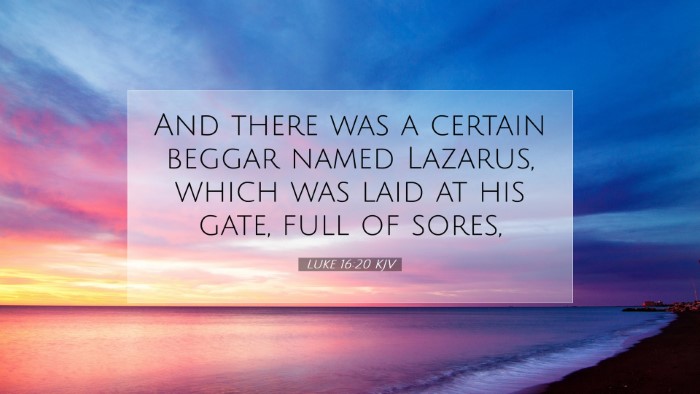Bible Commentary on Luke 16:20
Luke 16:20 states: "And there was a certain beggar named Lazarus, which was laid at his gate, full of sores." This verse introduces us to two contrasting characters: the rich man and the beggar, Lazarus. The narrative of Luke 16, often referred to as the story of the rich man and Lazarus, serves as a profound moral and theological lesson. Below is a summary of insights drawn from various public domain commentaries.
Contextual Overview
This passage occurs within the broader context of Jesus’ teachings about wealth, poverty, and the afterlife. The parable illustrates the divergence between earthly existence and eternal destinies, emphasizing the implications of our choices in life.
Character Study: Lazarus
Lazarus, whose name means "God has helped," is depicted as a beggar in dire conditions. Each aspect of his condition is significant:
- His Name: The choice of the name Lazarus is deliberate and serves to highlight the theme of divine help amidst suffering. According to Matthew Henry, this name might also symbolize God's grace, which reaches the most destitute.
- His Condition: Lazarus is full of sores, indicating not only physical suffering but also social isolation and disregard from society. Albert Barnes comments on the indignity faced by the poor, drawing attention to societal failures in caring for the marginalized.
- His Position: Laid at the gate of the rich man, Lazarus signifies the reality of poverty and suffering right beside the affluent. Adam Clarke notes that the spatial proximity emphasizes a moral responsibility that the rich man neglects.
The Rich Man: Contrast in Status
The contrasting figure of the rich man, although unnamed, represents those who lead lives of luxury without compassion. The lack of a name emphasizes the moral teachings of this parable:
- Wealth and Responsibility: The richness of the man is not a sin in itself, but his subsequent lack of action toward Lazarus is criticized. Matthew Henry elaborates that wealth should lead to charity, not exclusion.
- Spiritual Blindness: The rich man’s obliviousness to Lazarus’ plight highlights the dangers of materialism. Adam Clarke notes that superficial focus on earthly pleasures leads to neglect of spiritual duties.
Theological Implications
This parable serves several profound theological implications:
- Division of Worlds: The dichotomy between the beggar Lazarus and the rich man illustrates a stark contrast in their eternal states post-death, reflecting Jesus' emphasis on the inverted values of the Kingdom of Heaven. Albert Barnes indicates that worldly riches do not equate to divine favor.
- Awareness of Suffering: This narrative encourages the faithful to remain aware of suffering and injustice around them. It serves as a call to action to emulate Christ by serving those in need, in line with Matthew Henry's view on practical godliness.
- Judgment and Mercy: The fate of the rich man and Lazarus serves as a reminder of divine justice and mercy—a central theme in Christian doctrine. Adam Clarke posits that the consequences of our earthly deeds have eternal ramifications.
Application for Today
This passage not only provides theological insight but also practical guidance for contemporary readers:
- Awakening Conscience: Pastors and theologians should encourage their congregations to confront their own attitudes toward wealth and poverty, reflecting on how societal imbalances impact the lives of the underprivileged.
- Encouragement for Activism: The plight of Lazarus serves as a rallying cry for social justice and charity work within church communities. Both Matthew Henry and Albert Barnes emphasize putting faith into action.
- Personal Reflection: Individuals are called to examine their own spiritual and moral standings in light of this parable, assessing whether they act as good stewards of their resources and blessings.
Conclusion
Luke 16:20 is a stark reminder of the consequences of indifference towards suffering in the world. By reflecting on the figures of Lazarus and the rich man, we are invited to re-evaluate our values, responsibilities, and the way we engage with both the material and spiritual aspects of life. As we study this parable, may we find ourselves challenged to embody compassion, advocate for justice, and seek heavenly treasures over earthly ones.


